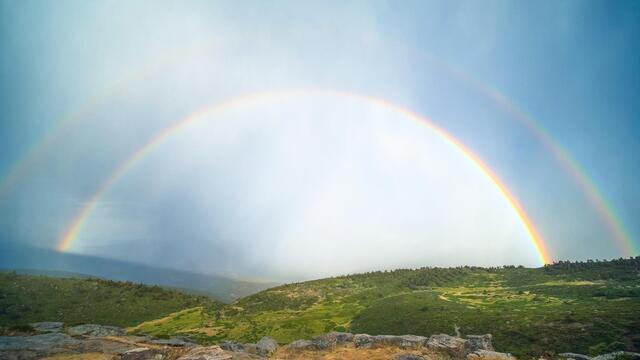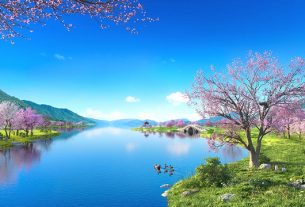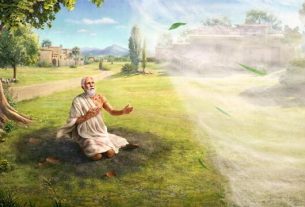Liu Fang
As I looked outside the car window, I saw a rainbow appeared in the sky. It had just rained. This reminded me of the story of the great flood during Noah’s time that destroyed the earth, and that God used a rainbow to establish His covenant with man.
In Genesis 6:13, God said, “The end of all flesh is come before me; for the earth is filled with violence through them; and, behold, I will destroy them with the earth.” When I first read this verse, all I knew was that during Noah’s time, people were sinful, sexually immoral and corrupted, so God had to destroy the earth through a great flood. However, only Noah worshiped God, his family of eight built the ark according to God’s instruction and eventually survived the great flood. Later, I read God’s words in Genesis 9:11-13, “And I will establish my covenant with you, neither shall all flesh be cut off any more by the waters of a flood; neither shall there any more be a flood to destroy the earth. And God said, This is the token of the covenant which I make between me and you and every living creature that is with you, for perpetual generations: I do set my bow in the cloud, and it shall be for a token of a covenant between me and the earth.” I was puzzled and wondered why the rainbow was used as a sign of covenant and what the intention was behind this covenant between God and man. One day, I read two paragraphs from a book that touched my heart, which gave me more revelation regarding why God used the rainbow to establish His covenant with man.
It is said, “Originally, God created a humanity that in His eyes was very good and close to Him, but they were destroyed by flood after rebelling against Him. Did it hurt God that such a humanity just instantly vanished like that? Of course it hurt! So what was His expression of this pain? How was it recorded in the Bible? It was recorded in the Bible as: ‘And I will establish my covenant with you, neither shall all flesh be cut off any more by the waters of a flood; neither shall there any more be a flood to destroy the earth.’ This simple sentence reveals God’s thoughts. This destruction of the world pained Him very much. In man’s words, He was very sad.”
“Was the destruction of the world this time something God wanted? It was definitely not what God wanted. We might be able to imagine a small part of the pitiful sight of the earth after the destruction of the world, but we cannot come close to imagining what the scene was like at the time in God’s eyes. We can say that, whether it is the people of now or then, nobody is able to imagine or appreciate what God was feeling when He saw that scene, that image of the world following its destruction by flood. God was forced to do this due to man’s disobedience, but the pain suffered by God’s heart from this destruction of the world by flood is a reality no one can fathom or appreciate. That’s why God made a covenant with mankind, which was to tell people to remember that God once did something like this, and to swear to them that God would never destroy the world in such a way again. In this covenant we see God’s heart—we see that God’s heart was in pain when He destroyed this humanity. In the language of man, when God destroyed mankind and saw mankind disappearing, His heart was weeping and bleeding. Isn’t that as best as we can describe it? These words are used by humans to illustrate human emotions, but since man’s language is too lacking, using them to describe God’s feelings and emotions doesn’t seem too bad to Me, and nor is it too excessive. At least it gives you a very vivid, very apt understanding of what God’s mood was like at the time. What will you think of now when you see a rainbow again? At least you will remember how God was once in sorrow over destroying the world by flood”(“God’s Work, God’s Disposition, and God Himself I”).
Before I read these words, I always thought that people during Noah’s time were wicked and corrupted. Because of God’s anger and hatred toward man, He would be happy when He destroyed mankind. But I realized that I was totally wrong after reading this. The essence of God is love. He is utterly hurt when He saw mankind destroyed by the flood. He was unwilling to destroy His creation, which He created with His own hands. Therefore, God commanded Noah to build an ark and preach about the coming of the great flood. God allowed human to repent during more than 100 years which Noah took to build the ark. As long as men repented, He would let them continue to live. However, regardless of how God reminded and exhorted them, no one was willing to accept God’s good intention and repent. They didn’t believe the great flood was to happen and they even mocked Noah and his family for following God’s command to build the ark. The disposition of God is righteous and holy, and He does not allow any filth or corruption to remain. Eventually, He had to destroy those who were corrupt and wicked and didn’t repent.
When God saw that every land was covered with water, there were no more forests and no human breath, He was sorrowful. Even with this sorrowful heart, God still cared for mankind. As a sign of warning humans not to do evil, God set His covenant with man using the rainbow and swore that He will never ever destroy human with a flood. As it is written in a book: “On the surface, God did an easy thing to farewell the previous humanity, settling the past and drawing a perfect conclusion to His destruction of the world by flood. However, God had buried the pain from this moment deep inside His heart. At a time when God did not have anyone to confide in, He made a covenant with mankind, telling them that He would not destroy the world by flood again. When the rainbow appears it is to remind people that such a thing had once happened, to warn them not to do evil things. Even in such a painful state, God did not forget about mankind and still showed so much concern for them. Is this not God’s love and unselfishness?” (“God’s Work, God’s Disposition, and God Himself I”).
Yes, it is the unconditional love of God. He kept all the hurts that were brought by the destroying of humans, cared for this mankind and guided the lives of Noah and his family on earth. God gives His ultimate care to humans and His love for humans is real and genuine. Therefore, since the covenant was established and after Noah’s time until now, never again did the same great flood happen. God is trustworthy and will never break His promises. This is the proof of His authority. As the word of God said, “He is as good as His word, and His word shall be accomplished, and that which is accomplished lasts forever.” Since then, the rainbow has appeared after rains and it reminds us that God will never destroy mankind through a flood, from which I felt the love of God and how He takes care and cherishes human beings.
The sound of car honk awakened me. There were more and more cars and people on the street. Once again, I lost in thought: People of these days are even more corrupted than those during Noah’s time. The Lord Jesus said, “But as the days of Noe were, so shall also the coming of the Son of man be. For as in the days that were before the flood they were eating and drinking, marrying and giving in marriage, until the day that Noe entered into the ark, And knew not until the flood came, and took them all away; so shall also the coming of the Son of man be” (Mat 24:37-39). It is a prophecy of the second coming of Christ in the last days. Looking around at those who enjoy worldly life, are sexually immoral, and worship evil, their every word and deed are against what is right, and they are not interested in positive things. Everyone is greedy and selfish and competing with each other with maliciousness, treachery. Even parents and siblings are against each other for their own benefit. In addition, people’s hearts are filled with God-denying and God-resisting heresies and they don’t believe His second coming. How will God treat this kind of people?
When Noah first preached that God would destroy the world with a flood, God gave humankind an opportunity to repent, however no one believed him. Because of their corruption and rebellious nature, God finally destroyed them with the great flood. Likewise, God hates human evil behavior nowadays, but He is also merciful toward man. Therefore, God gave us the opportunity to repent by bringing us the everlasting gospel in the last days. He speaks to us and rescues us from corruption. As mentioned in Revelation 14:6, “And I saw another angel fly in the middle of heaven, having the everlasting gospel to preach to them that dwell on the earth, and to every nation, and kindred, and tongue, and people.” And as mentioned in John 16:12-13, “I have yet many things to say to you, but you cannot bear them now. However, when he, the Spirit of truth, is come, he will guide you into all truth: for he shall not speak of himself; but whatever he shall hear, that shall he speak: and he will show you things to come.”
Even though we are evil and corrupted, God still continues to carry out His work of saving mankind with all truths that we need to be saved in the last days. Then how do we respond to those who share the kingdom gospel with us? Will we be the same as those during Noah’s time, stubborn and unrepentant? Our Lord Jesus said: “Blessed are the poor in spirit: for theirs is the kingdom of heaven” (Mat 5:3). “What I tell you in darkness, that speak you in light: and what you hear in the ear, that preach you on the housetops” (John 10:27). When we hear the kingdom gospel being preached, we should be humble and come with an open mind, hearing the voice of God attentively and letting the word of God guide us, letting His word be the foundation of our existence, never pursuing the evil trends of this world. We should refrain all negative things and live in the light of God forever. This will be our right choice.
As I stopped thinking and looked up to the sky again, the rainbow was still there, and my heart was full of gratitude to God. I silently prayed in my heart: “God, I am willing to repent, when someone preaches to me the gospel of Your second coming, I will listen to Your voice and follow Your footsteps.”




